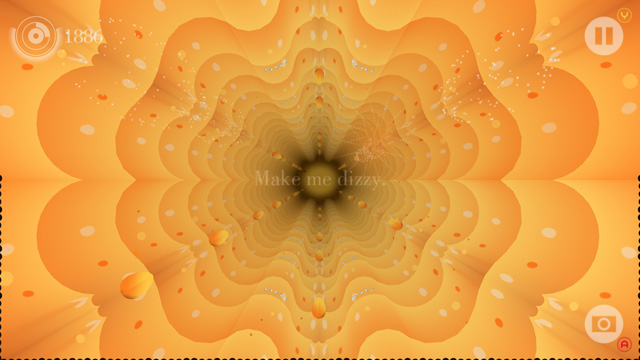Interview: Tale of Tales

A few weeks ago, I wrote about flower tunnel stroking game Luxuria Superbia. I argued that, as a game about sex, it’s more interesting than most other games, but still unconvincing. While the mechanics of sensual touching and stroking hit closer to home than repeatedly pressing X for sex, I felt no emotional connection to the touch screen I was supposed to help get off. Michaël Samyn from Tale of Tales didn’t agree, called this view naive and so we decided to talk. Here’s a somewhat edited transcript of our email conversation.
Dennis Michaël, you called out my article as naive because I was critizing the game on the grounds of it being a representation of sex. I honestly find it very hard not to read Luxuria Superbia as a game that deals with sex. If it’s not about sex, why then are the messages that pop out on the screen (stroke me, kiss me) so evocative of sex?
Michaël SamynMy criticism was on your assumption that Luxuria Superbia was a representation. It is not. In the few sentences above you seem to equate a lot of concepts that are very different to me: represent, deal with, being about and being evocative are all very different things to me. I may agree with some while I disagree with others. Or I may actually have more nuanced opinions about each. In the end it doesn’t matter what I think. All I want is that people enjoy our work. Some people deeply enjoy Luxuria Superbia when they play it as a sex simulation. But since you didn’t, I’d encourage you to play it differently.

DennisI’d love to play it differently, but I just don’t see it. What, if not sex, is your game about? What did you try to communicate with it?
MichaëlWe don’t use art to communicate. We use Twitter for that and email. For us, art is investigation, poking at reality and seeing how it responds, looking at things in different ways, sharing certain ways of looking at things to see how people will respond. And above all trying to show the beauty in life. Our games are research projects that we involve the players in. All together we look at a collection of topics and emotional triggers and figure out what they could mean. This is a never-ending process. A process of trying to connect to existence a bit better. To appreciate and enjoy life more. So I might use the word “about” sometimes when describing our work. But frankly, I don’t know what our work is about. I shouldn’t. All art is a question. Otherwise it becomes propaganda. I like certain propaganda. But it’s not what I want to make as an artist.
DennisOkay, fair enough. I admit, I was clumsy in my wording with the “about” question. I do understand that art rarely is “about” anything specific. But I’m still interested in what inspired Luxuria Superbia.
MichaëlThe first idea that came to us was of a flower-like tunnel with interactions inspired by having sex. In a second iteration, we added another idea to do with ancient cosmology and numerology. These two ideas started infecting each other because there was so much overlap, so many parallels, formally and content-wise. When the movement of the planets collapses with the movement of bodies in a bed, one almost automatically transcends into divine atmospheres. That the planets in our solar system are named after Roman gods didn’t exactly hold us back.
The structural inspiration for Luxuria Superbia is the transition through a cathedral, from the small square portal, through the extending nave and ceiling and culminating in the star of the choir or the perfect circle of a dome. This same transition occurs in Buddhism as well, where the base of a temple like Borobudur would be square and decorated with sensual elements (such as the Kama Sutra) and the top of it would be circular and devoted to the spirit. Mosques tend to have a similar layout: square on the earth, circle towards heaven.
In the context of playing, the concept of pleasure is prominent. And while religions tend to divide sensual and spiritual pleasure, and advocate the triumph of the latter over the former, we wanted to unite them in Luxuria Superbia, to remove the artificial separation between body and mind, to join them in an embrace of the beauty and joy in life.
This desire has its roots in our deep enjoyment of Old Master paintings, sculptures (and even music). Many of these have ostensibly sacred themes, the appropriate religious interpretation of which we, as secular modern people, may have trouble with. But they are at the same time also often intensely sensual. Not only do they regularly feature nudity and very beautiful characters, but the depiction of fabrics, jewels, food, flowers, landscapes, etc also stimulates our sense of touch. We find the ambiguity of a religion that all but rejects earthly existence manifested with such sensuous glory very beautiful, very human.
We actually made the sexual references in the early levels more clear to help players understand how to play the game, sex being very familiar to most people. This way we didn’t need to add an explicit tutorial and could keep the instructions minimal.

DennisYou put a lot of yourself into your game. How does that relate to dealing with criticism?
MichaëlWhat is this “self” that you are talking about? Most of my “self” is other people, society, culture, history. I claim no ownership of this self. I merely take care of it in service of life.
There’s so many layers to this “self”. And they often contradict each other. Indeed, maybe a few of them shine through in our work. Because art, for us, is about sharing. Sharing and connecting.
But our work is not “about” us. And criticism only really affects us when it is clear that the person didn’t get the work. That they didn’t enjoy it. Because above all we want to bring joy.

DennisLet’s talk about possible other interpretations. Critics like Leigh Alexander, Joe Köller, Rainer Sigl) have argued that Luxuria Superbia is about the fetishization of our devices. Rainer Sigl quipped that we probably spend more time caressing our phones than other human bodies. What’s your take on that?
MichaëlWe love those interpretations! There’s a lot of truth in them. It’s definitely something that is worth considering in depth, to be aware of in our casual interaction with technology.
We’re a little bit divided on this ourselves. Auriea is happy to think of Luxuria Superbia as something that gives a voice to a piece of hardware. While I think more of the game as a sort of “ghost in the machine”, an ethereal being that is not bound to a particular device.

DennisHow did you find the critical reception of Luxuria Superbia overall? How did people react to it? Especially people playing it during shows and public spaces?
DennisThe biggest surprise was that most people who play the game really enjoy it. We’re used to a bit more controversy and confusion. But Luxuria Superbia is far more clear. It was also interesting to see how deep the evaluation of the game took some critics. Luxuria Superbia seems to be important for different reasons to different people.
It’s also interesting to see that mainstream publications like Slate, The Verge and The Guardian were perfectly willing and capable to appreciate the game, while it has been more or less ignored by the large game publications. To some extent, this is a success because we always want to reach out and we long for a world where everyone is involved with games-as-media. But it does make one wonder about the game press. I guess they’re too busy (or simply very comfortable) reviewing Military Shooter Game #634.
The reactions in public spaces have been quite fascinating. When people play Luxuria Superbia in the company of others, suddenly there’s this feeling of sharing something intimate. Something we usually don’t talk about but through playing Luxuria Superbia, people are able to connect with each other and appreciate each other’s humanity more. That is really beautiful to witness and experience.
DennisAlright, to close off: If you were to design a Tale of Tales game that was clearly about sex, how would you approach that?
MichaëlI’m not sure that this “about” word makes much sense in art. Especially not in interactive art. For me the experience of the spectator/user/player is central. Art is not a means of communication. At least not in the conventional sense as a way to talk about something, to send a message. Art is a way of sharing things with people and soliciting a response. A question: how do you feel about this? What does this do to you? And in that sense an attempt to make contact.
I’m also not interested in “clearly”. I like ambiguity, contradictions, mysteries. It’s the main reason why I chose to work with computers as a platform for my art. To liberate myself from any requirement of making clear statements, of drawing conclusions, of playing the horrible game of cause and effect.
Luxuria Superbia is not about sex. But it is inspired by sex. It recognizes the similarity between playing a game and having sex and attempts to close the gap somewhat. Obviously it only refers to a tiny fraction of human sexuality. That is why it cannot make the claim to be “about” sex. That and the fact that it can also be about a million other things.
DennisThank you, Michael!
4 Kommentare zu “Interview: Tale of Tales”
Kommentare sind geschlossen.
“We don’t use art to communicate. We use Twitter for that and email. For us, art is investigation, poking at reality and seeing how it responds, looking at things in different ways, sharing certain ways of looking at things to see how people will respond. And above all trying to show the beauty in life.”
<3
Da fällt mir doch gleich wieder ein warum ich zwar Kunst mag, mich aber so ungern mit Künstlern unterhalte. Wenn wir da alle drin sehen können was wir wollen, hab ich beschlossen das für mich in Luxuria Superbia um Dosenwürstchen geht, Entschuldigung, etwas über Dosenwürstchen geteilt wird.
Sex sells, yo!